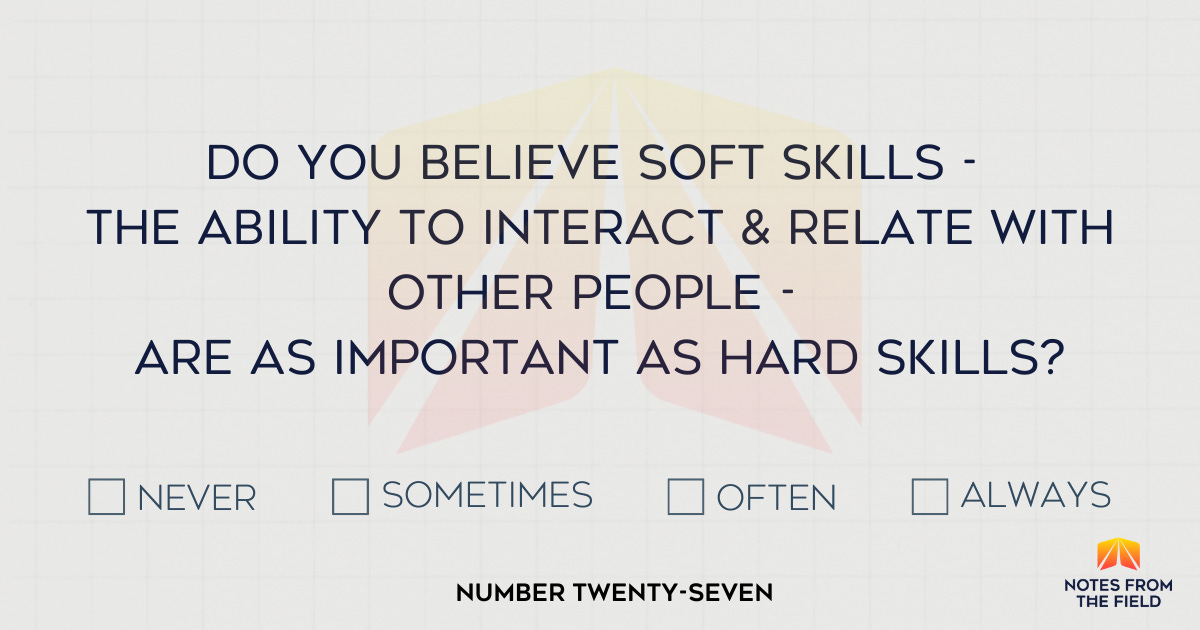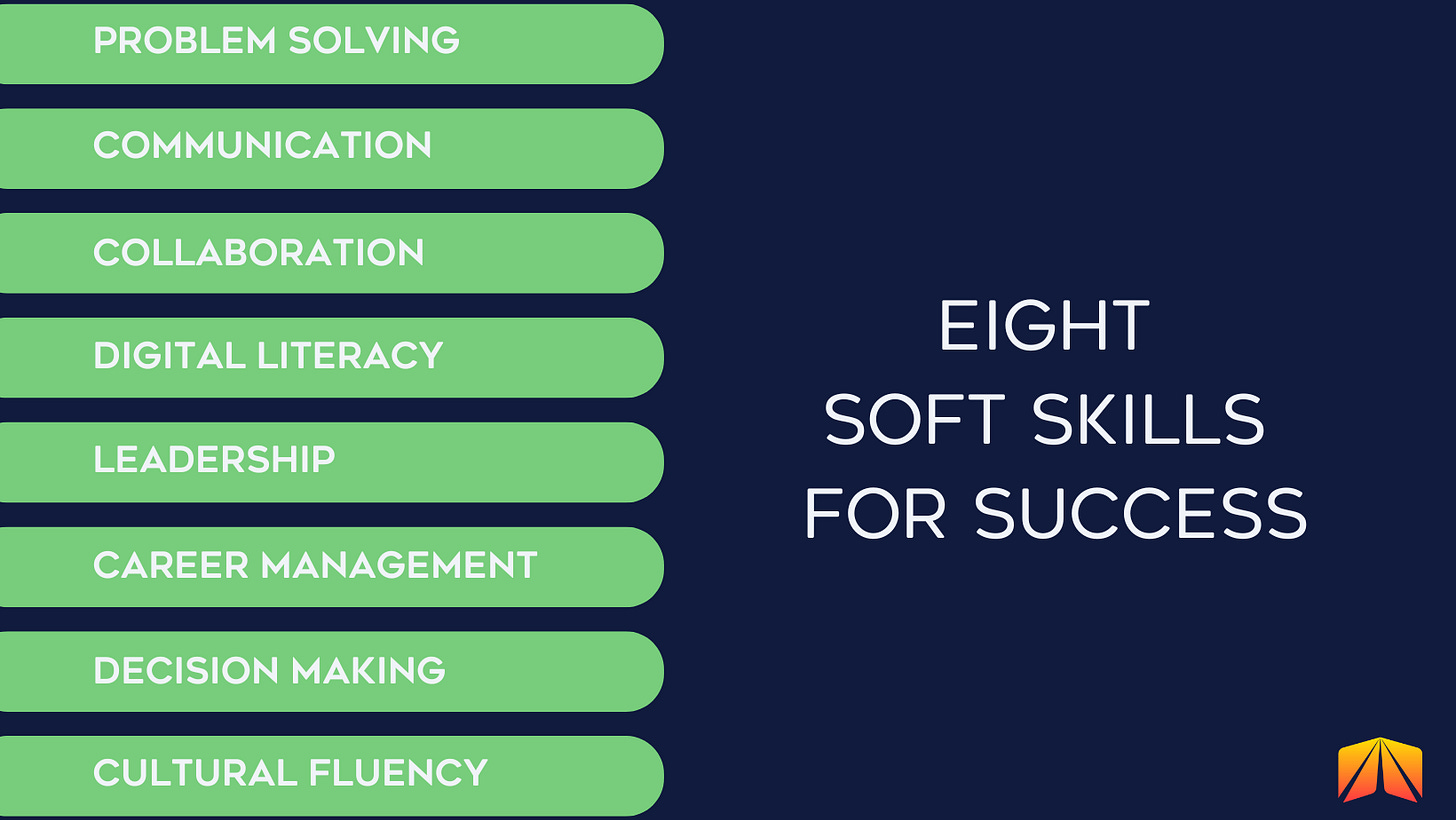Cultivating Soft Skills: An Introduction
Hard skills will open the door to your career; soft skills will determine your success.
In the professional sphere, soft skills - the ability to interact and relate effectively with other people - are the predictors of success. No objectives or goals are accomplished as a team of one; instead, the people skills, social skills, and personal skills will dictate how work is accomplished.
Differentiating Hard Skills vs Soft Skills
Imagine you're building a house:
Your hard skills are all the tools in your toolbox and the knowledge of how to use them. They're your technical prowess, like coding, financial modeling, or speaking a foreign language. These are the abilities you've honed through education, training, and practice, and they're easily quantifiable. Think of them as the bricks and mortar of your career: essential, solid, measurable, and visible.
If hard skills are the tools, then soft skills are the blueprint, the design, and the craftsmanship that turn a pile of bricks into a home. They include your ability to communicate effectively, work as part of a team, solve problems creatively, and adapt to new situations. These skills are less about what you do and more about how you do it. They're harder to measure, but as critical to success as hard skills. They're what make your work meaningful, impactful, and uniquely yours.
In the professional world, it's not enough to just have a great set of tools (hard skills); you need the vision and craftsmanship (soft skills) to use them effectively. The most successful individuals blend both, crafting careers that are not only productive but also rewarding and influential.
To put it simply: while hard skills might get you in the door, it's your soft skills that will help you negotiate the hallway of success. This is the balance that not only makes you a valuable team member but also a joy to work with.
The primary difference between soft skills and hard skills lies in their nature and application in the workplace and beyond.
Characteristics of Hard Skills
Hard skills are technical skills or specific abilities required to perform a job. They are often acquired through education, training, certifications, and on-the-job experience. These skills are about your ability to perform specific tasks and functions
Hard skills are specific to a particular job, task, or industry. While some hard skills can be transferable to other fields, they often have a direct application in a specific context
Hard skills include programming languages, machine operation, financial modeling, foreign languages, and software proficiency
Hard skills are typically developed through formal education, training programs, courses, workshops, and hands-on experience.
Hard skills can be more objectively measured than soft skills, through tests, certifications, performance in tasks, or demonstration of knowledge and abilities.
Characteristics of Soft Skills
Soft skills are interpersonal or people skills. They relate to how you work and interact with others, your emotional intelligence, and personal attributes. These skills are more about behavior and thinking, personal traits, and cognitive skills.
Soft skills are highly transferable and applicable in a wide range of situations and careers. They are not specific to any one job or industry.
Soft skills include critical thinking, communication, teamwork, leadership, career management and decision making.
Developing soft skills often involves improving one's emotional intelligence, gaining experience through diverse social interactions, and continuous reflection and practice in everyday life.
Measuring soft skills can be subjective and is usually assessed through observations of behavior, feedback from others, and self-assessment.
In summary, soft skills focus on personal interactions and behavioral competencies that enable people to work effectively and harmoniously with others, while hard skills are about specific professional abilities and knowledge required to perform job-related tasks. Both are essential for career success, with soft skills complementing hard skills to create a well-rounded, competent individual.
Professional Soft Skills for Career Success
In the early years of a career, establishing and cultivating soft skills along with your hard skills is essential to professional success. Over the next eight weeks, we’ll cover the following soft skills and development framework in depth:
Problem Solving
Problem solving is the ability to analyze information, identify problems, evaluate options, and implement solutions. It requires questioning assumptions, assessing evidence, and synthesizing information from various sources to make reasoned judgments.
In today’s fast-paced and complex world, challenges are multifaceted. Developing a problem solving ability enables individuals to make informed decisions, overcome obstacles, and implement effective solutions in both personal and professional contexts. These abilities are highly valued across all industries as they contribute to innovation, efficiency, and productivity.
Communication
Communication skills involve the ability to express ideas and information clearly and effectively. This includes articulating thoughts coherently, listening actively, and tailoring your message to your audience.
Effective communication is essential for teamwork, customer service, and leadership. It enables individuals to convey their ideas, persuade others, and build relationships. In the workplace, strong communication skills can lead to better collaboration, fewer misunderstandings, and increased productivity.
Collaboration
Collaboration refers to the ability to work effectively with others towards a common goal, respecting diverse perspectives and contributing to a cohesive group dynamic. This involves open communication, mutual respect, and shared responsibility.
In an increasingly interconnected world, the ability to collaborate with others is vital. It fosters innovation, as diverse viewpoints lead to creative solutions. Effective teamwork improves efficiency and enhances job satisfaction by fostering a supportive work environment.
Digital Literacy
Digital Literacy includes understanding and leveraging various digital tools and platforms to achieve specific goals. This includes competence with basic productivity suite programs, familiarity with software applications, digital communication tools, social media, and the ability to adapt to new technologies. Digital literacy is not just knowing how to use tools, but also understanding the impact of digital technologies on society and our personal lives.
With the digital transformation of industries, proficiency in digital technology is essential for staying competitive in the job market. It enables individuals to work more efficiently, access and analyze information quickly, and stay connected with colleagues and clients.
Leadership
Leadership is the ability to inspire, motivate, and guide others towards achieving a common goal. It includes setting a vision, making strategic decisions, and building and maintaining a team that is committed to that vision.
Effective leadership drives organizational success by fostering a positive and productive work environment. Leaders play a crucial role in managing change, motivating others, ensuring accountability for and achievement of strategic objectives and decisions.
Career Management
Career Management involves actively planning and managing your career path, including setting career goals, acquiring necessary skills, and seeking opportunities for growth and development.
Effective career management ensures that individuals are proactive about their professional development and advancement. It helps people to align their work with their personal goals and values, leading to greater job satisfaction and success.
Growth Mindset
Growth Mindset is the ongoing pursuit of knowledge and skills for personal or professional development. It involves a commitment to learning new things and keeping up to date with changes in your field. The goal is not just to accumulate knowledge, but to apply it creatively and effectively in your personal and professional life.
In a rapidly changing world, continuous learning is essential to stay relevant and competitive. It enables individuals to adapt to new challenges, technologies, and methods, enhancing their employability and career prospects.
Decision Making
Decision Making is the process of making choices by identifying a decision, gathering information, and assessing alternative resolutions. It involves critical thinking, problem-solving, and weighing the potential outcomes to choose the best course of action.
Decision making is crucial because it directly impacts the effectiveness and success of both individuals and organizations. Effective decision making leads to better problem-solving, innovation, and strategic planning, which are essential for navigating complex situations and achieving goals.
Cultural Fluency
Cultural Fluency involves understanding and respecting cultural differences, communicating effectively across cultural boundaries, and adapting to diverse environments. Cultural fluency is not just about knowing facts about different cultures; it's about adopting an open-minded and empathetic approach to understanding and interacting with people from all walks of life.
As businesses become more global and workplaces more diverse, intercultural fluency is critical for effective communication, collaboration, and conflict resolution. It fosters inclusivity and leverages the strengths of diverse teams.
Cultivating Soft Skills
Soft skills are interrelated and collectively contribute to personal and professional success. Developing them requires intentional effort and practice, but the benefits they bring to a career and personal life are invaluable.
In the tapestry of professional success and personal growth, soft skills are the vibrant threads that add depth, color, and strength. They encompass our ability to communicate effectively, collaborate with others, adapt to change, and solve problems creatively.
In a world where technical proficiency opens doors, it's our soft skills that build bridges—bridges between ideas and people, between diverse cultures, and between present challenges and future opportunities.
As we navigate the complexities of the 21st century, investing in the development of these skills is not just an asset but a necessity. They enrich our professional lives, enhance our personal relationships, and empower us to navigate the shifting landscapes of our global community with empathy, resilience, and vision.
In the words of Aristotle, "We are what we repeatedly do. Excellence, then, is not an act, but a habit." Let us make the continuous development of our soft skills a lifelong habit, for in their mastery lies the key to unlocking our fullest potential.





